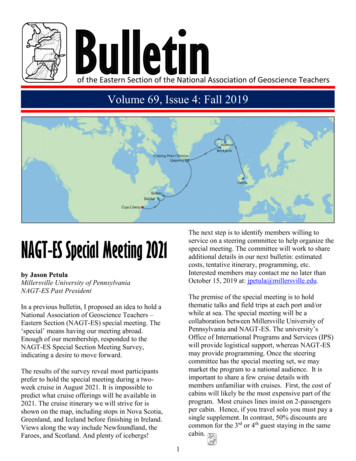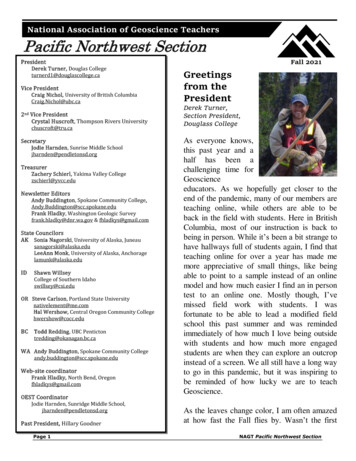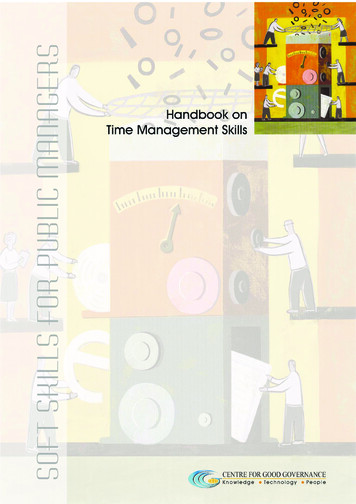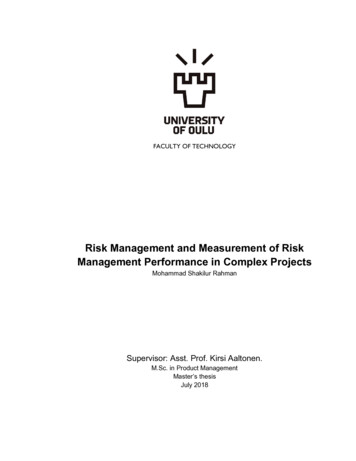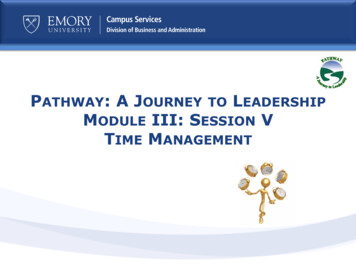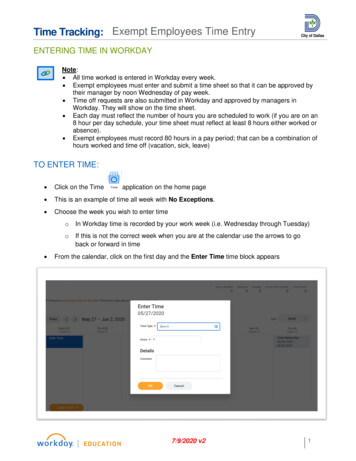
Transcription
Time ManagementAGU Heads & Chairs Workshop – December 2013Presented by Katryn Wiese City College of San FranciscoDISCLAIMER: ideas within this presentation come from an assortment of sourcesgathered over many years of giving this talk. They are provided with the understandingthat what works for one person may not work for another. And most importantly, mypresentation of these ideas in no way implies that I successfully employ any of them.
TIME ISLIMITEDWe CANNOT do everything.Pull out a sheet of paper.Goal: By the end of the nexthour, you will have createda list of concrete waysbetter manage your time.
THE CHALLENGEWe ARE departmentchairs because of one ormore of the following:a. We care about ourdepartment and wantto ensure that thingsare done well (by ourstandards).b. No one else can stepup or accomplishwhat “needs”accomplishing.c. We can’t say no.We ARE overcommittedbecause of one or moreof the following:a. We care aboutprojects and want toensure that things aredone well (by ourstandards).b. No one else can stepup or accomplishwhat “needs”accomplishing.c. We can’t say no.
THE SOLUTION1. Set your priorities2. Reduce the number of things youare trying to do.a.Delegate: where possible, learn toaccept things happening differentlythan the way we want them to.b. Reconsider whether things really do“need” to happen. And if so, find ordevelop additional resources to step up.(Delegate.)c. Learn how to say no.3. Be at peace with stopping yourefforts before they are perfect.4. Find ways to be more efficient and“waste” less time.
SET YOUR PRIORITIESIdentify your own valuesand how you want to liveyour life, and makechoices that align withthose values and priorities.Don’t let others chooseyour priorities for you.
CONSIDER:Make an ordered listof your priorities.For example:#1: My mental, spiritual, physicalhealth#2: My family#3: My joba) The studentsb) My future career desiresc) My own academic educationd) My departmente) The college as a whole #4: My friends, home, etc.
SUGGESTIONS Items that aren’t being done, but really need to be done (high priority,not necessarily most enjoyable), can be scheduled, like classes orappointments.Ignore due dates and do the highest priority tasks as soon as timebecomes available – something else ALWAYS comes up.Do the easy stuff when you have small chunks of time between largerprojects (when you feel unable/unwilling to start larger projects )Schedule time when you won’t work (like evenings, weekends, ormornings). This down time forces you to be more efficient at work(refraining from distractions and idle conversations during the day).Make your scheduled personal time unchangeable except foremergencies. (Treat like a class.)Make clear delineation between personal and work time.
REDUCE YOURWORKLOADDelegate. Learn to accept thingshappening differently thanthe way we want. Reconsider whether thingsreally do “need” tohappen. And if so, find ordevelop additionalresources .Learn how to say no.
DELEGATEYou don’t have to enact ALL good ideas.You don’t have to carry all the burden.Delegating is valuable tomore than just yourself:when everyone contributes,the atmosphere andenvironment improve foreveryone.
Developing resources for DELEGATIONSpread out among faculty –here’s what I can do; here’s whatI can’t – anyone want to take anyof these on or do we let them go?Be willing to let things go Be willing to let them be donedifferently.
THINK YOU CAN’T DELEGATE TOYOUR COLLEAGUES?Change your attitude.Everyone has something of value to contribute. It might bechallenging to find it, but it’s there. Nurture it.(If you think it’s not there, you won’t find it.If you believe it is there AND that you can find it, you will.)
Developing resources for DELEGATIONGive up things you mightreally want to do to folkswhose energy is bestdiverted there (best hope oftheir cooperation)Be okay with it happeningpoorlyBe okay with it nothappening
CONSIDER:What is one thingyou’ve successfullydelegated in thepast?What are somethings you’recurrently doing thatyou could delegateor give up? (even if theyare things you REALLYwan to do yourself)
Group ActivityShare SUCCESSFUL examples.
LEARN HOW TO SAYEXAMPLE:“You know, I really want tohelp out, but I know thatright now I just won’t be ableto give you and this projectthe time and commitment itdeserves. So I have to say no.Thank you for asking.”NO
YESREALLY MEANS NO TOSOMETHING ELSE YOU’REALREADY DOING
Just because an opportunityarises that you really wantto do or that you feel a deepsense of obligation to dodoesn’t mean you shoulddo it.If you sign up for too much,you will go crazy trying toget it all done. And it willbe hard to ensureeverything is done reallywell
CONSIDER:What is a good exampleof when you successfullysaid no in the past?(Results)What is one thing in yourlife that you really wantto do, but you know youshould defer until youhave more time?What is one thing thatyou would like tosay no to?
Group ActivityShare SUCCESSFUL examplesof when you were able to sayNO. How did you do it? Howdid it feel?
SOME STRATEGIES FOR NO Have a policy that says you won’t (even if you havetime) say yes to any requests that must be completedin the next 24 hours (set a standard that folks need togive you time if they want your commitment –good for students and coworkers). Don’t hesitate to say you’re busy, even if the “busy” is personal timethat you’ve scheduled. That should be equally important to othercommitments. Be firm and polite. You can be sympathetic, but don’t appear wishywashy, or they’ll push. You don’t need to provide lengthy explanations about why you can’tdo something. Keep it simple – it just doesn’t fit in your schedule.Otherwise you sound defensive and encourage further pushing. No sending of email on weekend or at nights. You can respond, butqueue it up. Don’t send it. Otherwise folks start expecting you to beworking at those times. No working on “other” work when it’s time set aside for a specificproject.
BE AT PEACE WITH THINGS NOTHAPPENING AS PERFECTLY AS YOUCOULD DO ITCalculate the % ofyour time you arewilling to give to aparticular job and thenstick to it. Schedulethat time.Examples: 8 hours a week 2 hours a day 1 day a week
CONSIDER:What is one thing in yourlife that you’ve alreadysuccessfully put limits on?(Results?)What is one endlesstime-eating activity inyour life that youshould set boundarieson and be okay with lessthan perfection?
Group ActivityShare SUCCESSFUL examples.
INCREASE EFFICIENCY ANDREDUCE WASTE
AVOID TIME PITSSet time limits on activities in which you lose track of timelike unscheduled office hours, e-mail, web design, graphics, etc.Avoid checking e-mail, internet, or answering phone as soonas they present themselves – instead set aside timespecifically for those tasksAvoid doing e-mail first thing in the morning – getsomething on your To-Do list done firstMeet students in common areas so it’s easier to exit at the endof the allotted time
MORE SUGGESTIONS Keep a To-Do or Tasks List and Calendar (manysoftware programs can help, like Googlecalendar)Use a calendar with moveable sections/tasks, soyou can keep track of tasks, even if you need tomove them. You can use this process to scheduleprojects and set goals.Break large projects into small steps and goals.Schedule each.Stay organized on desk and desktop (computer)– purge excess paperFocus on getting at least one BIG thing donedaily.
MORE SUGGESTIONS Write notes at the end of the day to record whereyou are and where you want to start again the nextday. This process can help you get on track the nextday faster.Reduce distractions by hiding, or closing door up toa crack, and/or having sign on door explaining youare “writing” or “grading” or
CONSIDER:What is one of yourbest time-savingtechniques?
Group ActivityShare SUCCESSFUL timesaving techniques.
CONSIDER:What new strategies did you hear today that youplan to use (or old ones that you’re now ready for)?How and when will you enact them?
give you time if they want your commitment - good for students and coworkers). Don't hesitate to say you're busy, even if the "busy" is personal time that you've scheduled. That should be equally important to other commitments. Be firm and polite. You can be sympathetic, but don't appear wishy washy, or they'll push.
